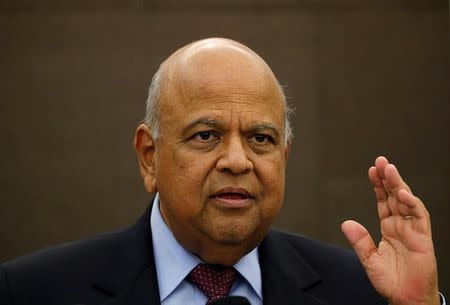South Africa's Gordhan says complied with police as row widens

By James Macharia JOHANNESBURG (Reuters) - South Africa's finance minister said on Thursday that he had complied with a police investigation, in a widening dispute which has also pitted government agencies against each other and rattled financial markets. Finance Minister Pravin Gordhan declined last week to obey a police summons linked to the inquiry into whether he had used a tax service unit to spy on politicians including President Jacob Zuma. Gordhan said he had done nothing wrong. His lawyers, Gildenhuys Malatji Inc., reiterated that Gordhan had offered to help police with their inquiries. The ruling African National Congress (ANC) had urged him on Tuesday to cooperate with the police. Zuma has said he backs Gordhan but cannot stop the investigation, and some senior ANC party members have criticised the finance minister for not obeying the summons. With the economy close to recession, the political tensions have weakened the rand currency and government bonds and prompted an asset manager to review funding to state-owned firms. The rand has weakened nearly 9 percent since Aug. 23 when the elite police unit Hawks summoned Gordhan. "The Minister responded fully to all the Hawks' enquiries, offered to provide any further assistance they might require and scrupulously acted in accordance with the law," Gordhan's lawyers said in a statement. Gordhan is due to accompany Zuma to the summit of the Group of 20 (G20) leaders in China next week, the presidency said. The row widened on Monday when the Treasury accused state-owned power utility Eskom of blocking a probe into its coal contracts with a company linked to the wealthy Gupta family. Eskom denied the claims, saying it was cooperating. Opposition parties accuse the Guptas of holding undue political sway over Zuma. The Guptas and Zuma have denied this. Deputy President Cyril Ramaphosa told parliament that "wild and sensational statements" over the past few weeks could destabilise the economy and steps were being taken to end political rows. He did not detail these steps. Seeking to assuage nervous investors, the government said in a statement on Thursday that it was "committed to achieving its fiscal objective of stabilising and reducing debt ... Government reassures investors that South Africa is open for business." The rand fell further on Wednesday when Futuregrowth, which manages client assets of around $12 billion, said it would no longer lend to six state-owned firms, including Eskom , citing political uncertainty raised by the investigation of Gordhan. The ANC said on Thursday that it was "erroneous" to conclude that the state-owned companies were beset by corporate governance problems, but the main opposition party called Futuregrowth's decision a vote of no confidence in Zuma. The state companies "are in a dire state, costing the country billions," said the Democratic Alliance, which took control of Johannesburg and the municipality that runs the capital Pretoria at the Aug. 3 local government polls. LENDING BACKLASH Futuregrowth said it was also concerned that the cabinet planned a new committee, supervised by Zuma, to oversee state-owned enterprises. The presidency defended the plan, which analysts said would limit the finance minister's control over state firms, including cash-strapped South African Airways. Eskom said Futuregrowth's lending freeze would not affect its funding for the current financial year, which ends in March. Transnet also said its $26 billion infrastructure investment programme would not be affected yet. "We hope that the current uncertainties and governance concerns will soon be resolved and this will likely impact our views on the attractiveness of SOE (state-owned enterprise) debt as an investment for our clients," said Andrew Lapping, chief investment officer of Allan Gray investment. Steve Cook, London-based co-head of emerging markets fixed income at PineBridge Investments, said the tussle over state firms was "creating uncertainty around all South African financial assets including dollar bond prices." Investors have become wary since last December when Zuma changed finance ministers twice in one week. (Additional reporting by TJ Strydom and Ed Stoddard in Johannesburg, Wendell Roelf in Cape Town and Karin Strohecker in London; Writing by James Macharia; Editing by Richard Balmforth)

